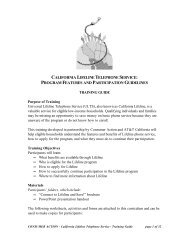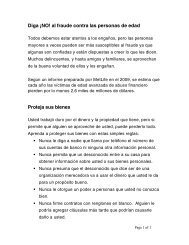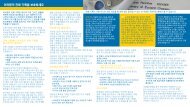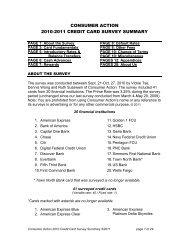Test Your Knowledge About Wireless ... - Consumer Action
Test Your Knowledge About Wireless ... - Consumer Action
Test Your Knowledge About Wireless ... - Consumer Action
Create successful ePaper yourself
Turn your PDF publications into a flip-book with our unique Google optimized e-Paper software.
on the wireless 911 service read FCC <strong>Consumer</strong> Facts at <br />
www.fcc.gov/cgb/consumerfacts/wireless <br />
<br />
Carriers can provide location information from the cellular network (triangulation <br />
of location based on the distance of the cell phone’s signal to nearby cellular towers) <br />
or rely on satellite data from global positioning system (GPS) chips embedded in <br />
customer handsets. <strong>Wireless</strong> carriers that use CDMA technology, such as Verizon <br />
and Sprint Nextel, employ GPS technology to fulfill E911 requirements. AT&T and T‐<br />
Mobile use network‐based technology that computes a phone’s location using signal <br />
analysis and triangulation between towers. <br />
<br />
The Privacy Rights Clearinghouse says this location‐tracking feature has privacy <br />
implications. Even without a warrant, law enforcement personnel may obtain either <br />
retrospective or prospective location data on your calls. Retrospective data is kept <br />
by cellular carriers for billing purposes and may not be very detailed. In contrast, <br />
prospective data can reveal where you are in real time and is used by some apps and <br />
software programs, as well as marketing programs such as coupon providers. <br />
<br />
13. For a small fee, anyone can obtain a record of your cell phone calls. <br />
<br />
FALSE <br />
Only the authorized owner of the cell phone can obtain the cell phone records for <br />
that account. The Telephone Records and Privacy Protection Act of 2006 prohibits <br />
“pretexting” to buy, sell or obtain personal phone records, except when conducted <br />
by law enforcement or intelligence agencies. Violators are subject to jail terms of up <br />
to 10 years. <br />
<br />
As a consumer, you can also take action to ensure the security of your cell phone by <br />
creating account passwords to control access to your wireless account. <br />
<br />
14. If you receive unsolicited commercial email (spam) on your mobile phone, <br />
you can file a complaint against the sender with the FCC. <br />
<br />
TRUE <br />
If you receive a spam email on your mobile device, you can file a complaint with the <br />
FCC. The FCC's CAN‐SPAM rule applies to email messages—but not texts—sent to <br />
cell phones and pagers. You can tell if the message is an email if it uses an Internet <br />
address that includes an Internet domain name (such as @YOURDOMAIN.COM). The <br />
FCC rule does not prohibit unsolicited texts or 'short messages' sent from one <br />
mobile phone to another. <br />
<br />
Bills in the U.S. Senate (S. 788) and House (H.R. 1391) would include text messages <br />
in the CAN‐SPAM ban. If you want to see that bill passed, please contact your elected <br />
officials. <br />
<br />
<strong>Consumer</strong> <strong>Action</strong> <strong>Wireless</strong> Quiz © 2011 <strong>Consumer</strong> <strong>Action</strong>






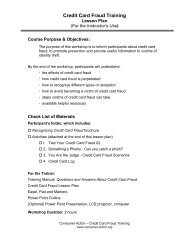

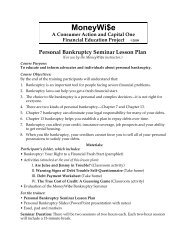
![Debt Collection Issue [Winter 2007-2008] - Consumer Action](https://img.yumpu.com/43405069/1/169x260/debt-collection-issue-winter-2007-2008-consumer-action.jpg?quality=85)


